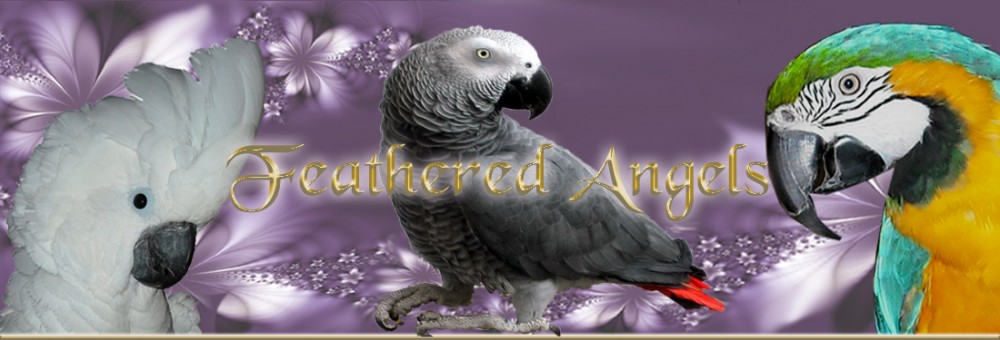Who’s the bad bird? Flock Call
written by Kathy LaFollett
Behaviorists, trainers and parrot manipulators tend toward the idea that we can literally direct our parrots to behave a certain way. I suppose that’s true to some extent. But when the manipulation techniques have to be revisited, or reapplied was it successful in the end? I would say no. It was manipulation and that’s about it. The companion parrot reacted like Pavlov’s dog, and as with all parrots, literally decided one day they were done with that Pavlovian response.
So what is the biggest influence on our parrots? Our own attitudes. The epicenter of a parrot’s mindset starts and ends with our own.
They are, after all, looking to us for information to make judgements about trust and action. They are hypersensitive to emotions, movements, sounds, and objects by nature. A companion parrot is literally hardwired to take in more information than a human takes in. Humans are judgmental, we rationalize and reject things quickly if they do not fit our personal belief system and goals. Humans are the only creature that can lie to itself, and honestly believe the lie. This is the crux of the issue with most companion parrot relationship problems. This is where I start all points of work inside flocks with misunderstandings.
Health issues and hormones aside, a defensive parrot with trust issues picked up that trait from a human somewhere who preferred impatient demanding, and quick rejection when demands weren’t met. You can wrap all kinds of details and stories around that skeletal description, but in the end it boils down to that statement. Why is someone demanding? Time constraints or outside pressures of life, maybe a fight with a spouse. It doesn’t matter to the parrot though. All that matters is impatient demands were followed with quick rejection. The why is irrelevant. That’s the take away for companion parrots. The WHY something went wrong is irrelevant to a parrot.
The precious center of a happy Companion Parrot Lifestyle is the requirement that we as humans are required to be better humans. Seriously. A parrot can’t be fooled into believing you are a good trustworthy person. They may acquiesce temporarily due to their caging, handling or fear, but that won’t last long. I’ve walked into flock situations where the trust is nowhere to be found. I blame the human in the room. And then we go through a laundry list of reasons WHY the trust is gone. Normally the list starts with a bite. I blame the human in the room.
Companion parrots are not complicated. They are difficult. Difficult because we are literally sharing our space with a companion that does not rationalize nor simply obey. A parrot knows a lie, but unlike a dog, they will not cooperate nor honor your lie. Period. You can create an obedient parrot (through trust and respect) or you can create a submissive parrot (through fear and uncertainty). The later parrot will become a shell of itself, merely surviving your demands rather than growing inside your flock to become part of the whole.
I don’t write this article in judgement or patronizing tone. I write this in celebration of the best part of being with a parrot. I write this because the most successful parrot personalities in the world were grown in a flock full of kindness, patience, and empathy. And you can’t have that type of fertile ground if the human in the room is impatient, mean, judgmental or prejudiced in life. It does not coexist. A happy parrot is literally defined by the human in the room. You hope your parrot is relaxed, well RELAX. You want your bird to love every one that visits, well LOVE every one that visits. Sincerely. You can’t be insincere around a companion parrot. They know better. And they will reject you and your company for it. Their rejection might be small like not taking a treat, or not allowing a head scritch, but they have you on their probation list for sure. I’ve been on probation before, I know!
Parrots are not complicated. Feed them healthy foods as you should eat. Love them as you would hope to be loved. Share life with them as you like having life shared with you. 12 hours of dark. A doctor for checkups. A bath. Clean water. Toys (employment opportunities). Safety. This isn’t rocket science. You are MORE than capable of handling the details of a companion parrot, and you don’t need to embellish these simple items with complexity.
But what you must do, what will always have to be done at all times ad nauseum is; be the best human you can be as much as you can. Be nice. Be fair. Be kind. Be thoughtful. Be patient. Love. Do not judge. Welcome in. Laugh, alot. Smile more. Wait easier. Be slow to speak, quick to laugh and certain to forgive. I suppose this all sounds corny and completely unrelated to having a parrot in the house if you don’t yet have a parrot. But I assure you, this is the way. It’s the only way that really works. Consider your heart, before you consider your parrot’s behavior.
You can’t give a parrot a happy home if you too, aren’t sincerely happy.

